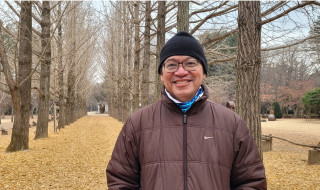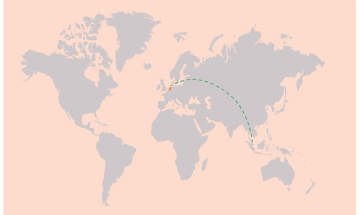How do they do it in Singapore?
Singapore is the beating heart of Asia's networking infrastructure. Numerous national research and education networks (NRENs) and companies in Asia and far beyond have linked their networks through the SingAREN Open Exchange. How did this ‘Global eXchange Point’ or GXP become so successful? We asked Francis Lee, founding president of SingAREN.
"Actually, we were mostly inspired by NetherLight," says Francis Lee. "With that hub for international connectivity, SURF was way ahead of many others. I was fortunate to learn from you guys."
That sounds very modest, but he makes it concrete. "First of all, I saw clear rules there for a GXP. Without that clarity, things would get very, very messy. Especially with international connections."

The second point was openness. "Everyone should be welcome. After all, that is the essence of such a hub! Countries don't have to make one-to-one connections, but can go to one place for all their connections."
The third insight was the importance of quality service. "You cannot say ‘OK, the problem is clear and in six months we will come up with a response’. We are not for profit, but work on a best-effort basis. By taking quick action you keep people happy."
Diverting data within the Asiapacific-Europe Ring
That formula has worked well, also in Singapore. The hub has become so important that SingAREN has started paying extra attention to business continuity, by operating in dual locations.
But even more redundancy is needed for business continuity, because the Internet enters Singapore primarily through submarine cables. "Those tend to break," says Lee.
The solution? Cooperation. In 2019, eleven European and Asian networking organizations joined forces to pool their connections in an Asiapacific-Europe Ring (AER). Now, if a cable fails, traffic is automatically rerouted. "It works seamlessly," Lee explains. "When our direct cable to Europe went down, the data went through Hong Kong and Japan to NetherLight. People barely noticed."
So it was no surprise that in 2022 the partnership was extended.
"If you have to rely on commercial internet, you can wait a very, very long time."
In addition to SingAREN and SURF, the AER partners include GÉANT and the NRENs of Australia, Hong Kong, Japan, Saudi Arabia, Scandinavia and South Korea. They see the value of collaboration, Lee says. "Asia and Europe need a good connection with each other. Our researchers can't do without it. Whether it's data from the Large Hadron Collider or other areas of research, reliable and ample network capacity is essential."
So can't the commercial sector provide that? Lee laughs: "If you have to rely on commercial Internet, you can wait a very, very long time for transferring large amounts of data. And for resilience, you pay an arm and a leg."
Cybersecurity important in Singapore too
For an NREN, SingAREN is young – founded in 2003 – and surprisingly small. "We employ as few as six people," Lee explains, "but we have a lot of volunteers. So when we want to do something, we set up a special interest group (SIG)." The city-state of Singapore is particularly compact, so it's easy to get together.
The latest SIG deals with cybersecurity – a major issue, also in Singapore. "We bought equipment that allows us to see what's going on in our network. And we are building tools that allow us to share information about threats. With those, we would be better able to work together as a community to develop a safer research and education network."
Looking to SURF for advice
Singapore, as a hub, for trade and for the Internet, bears much resemblance to the Netherlands. ‘Abroad’ is at least as big a place for Singaporeans as it is for us, so they are used to looking across borders. Does Francis Lee have any advice for SURF?
"Asia and Europe need a good connection with each other. Our researchers can't do without it.”
He laughs, "I would be asking advice from SURF, not the other way around! You guys are very well developed, and you have a lot more services than SingAREN provides to its members. That's why I always look at what SURF is doing - and NORDUnet for that matter. One area in which we can work together with SURF and other European NRENs is to accelerate collaboration between researchers in Europe and Asia."
The latter has already happened several times: FileSender, eduroam and eduGAIN are three of the services offered by SingAREN on its website.
Asi@Connect: connectivity as well as knowledge building
Lee is also looking around within Asia. The differences between countries and cultures are huge. You'll find New Zealand, but also Nepal. "We have to think of our neighbours. There are countries in Asia that are less developed in these areas. For them there’s a project funded by EU aid called Asi@Connect. It provides network connectivity, but also builds up capabilities in networking and scientific research. The Asian partners in the region also contribute to it, with connectivity, advice and support.” The Asi@connect link is also part of the Asiapacific-Europe Ring.
Lee: "The world is small. What happens in one place has consequences elsewhere. So why not try to do our bit, starting in our own region?"
He still sees many opportunities for cooperation between Europe and Asia. And SURF, he says, is one of the key partners in that cooperation.
Text: Aad van de Wijngaart
